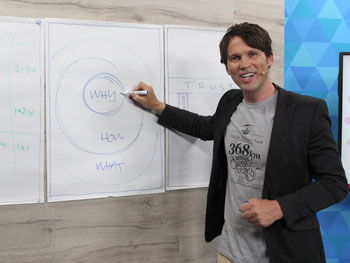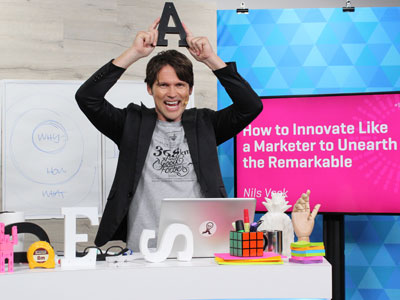Nils Vesk The Next Big Thing Interview

Expert Reveals How To Think The Unthinkable To Create Ground-Breaking Ideas
Getting one (or several) steps ahead of the competition in business is key, and staying there is imperative to success and survival.
To do so, businesses and leaders must be at the forefront of the latest trends in their respective industries. In fact, in this disruptive age, they not only need to understand the trends, but need to be the ones uncovering and converting them into winning opportunities, before the competition does.
Introducing The Next Big Thing from Ideas With Legs: At this one-of-a-kind masterclass, industry leaders will be coached by some of Australia's leading thought leaders, speakers, innovation consultants and CX strategists, to recognise disruptive trends ahead of the curve, and walk away with a roadmap of how to tackle the one big thing that threatens their company's very existence.
Nils Vesk, Founder of Innovation Blueprint and event organiser says, "Businesses can't afford to make the mistake of missing the next big idea. Through intimate and interactive workshops, leaders will discover the trends that will impact their industry, their team and their customers, and how they can capitalise on them, fast.
"Guided by leading experts in the key fields of innovation, HR and CX, C-Suite executives and business leaders will uncover the latest innovations generating breakthroughs and disruptive customer experiences."
The three speakers schooling attendees will be Blythe Rowe, former Senior HR for Bunnings and McDonald's, and Founder of Human Incite, Paul Carson, former COO of AXA Hong Kong and CX innovation strategist at Ideas With Legs, along with Nils Vesk, a global innovation consultant and Founder of Innovation Blueprint.
These leading speakers will be presenting on:
How To Be On The Cutting Edge Of A Revolution: Leaders will learn about automated fulfilment and how to create the next bot advancement, what smart tattoos are and how they can revolutionise a business, DNA diets, customisable products, and much more
The Next People Trends: Attendees will discover what the key developments are in terms of people, performance and leadership management and how to utilise these to get ahead
Recognising Cutomer Needs, Before They Do: CX design is the stuff of the future and makes a huge impact when it comes to differentiation in business and converting customers into a brand's biggest fans
Event dates: Sydney – Thursday, 31st May 2018. 8.30am – 12.30pm. Mr Tipply's, 347 Kent Street.
Melbourne – Friday, 1st June 2018. 8.30am – 12.30pm. The Cube, Federation Square.
Brisbane – Thursday, 14th June 2018. 8.30am – 12.30pm. The Fox, 71-73 Melbourne Street, South Brisbane.
Ticket price: $399 inc. gst.
For more information or to purchase a ticket, please visit: www.innovationblueprint.com.au/event-tickets/
Interview with Nils Vesk
Nils Vesk is an innovation architect who has delivered programs for some of the most prestigious organisations in the world, including Microsoft, IBM, Commonwealth Bank and Nestle. Nils will be hosting -The Next Big Thing' Masterclasses throughout May and June where business leaders will discover the trends that will impact their industry, their team and their customers, and how they can capitalise on them: https://www.innovationblueprint.com.au/event-tickets/
Question: How can we get ahead of the ever-changing face of business?
Nils Vesk: The key to getting ahead is to be forward thinking so that change does not come so unexpectedly. Do this by anticipating the future market your business will play in by identifying the emerging trends that will be the major disruptors. It's imperative that companies do this annually as part of their business planning. So, rather than only focussing on FY18-19, dedicate time to pre-planning FY19-21.
 Question: What does innovation look like in the current business space?
Question: What does innovation look like in the current business space?
Nils Vesk: Innovation in the organisations that are the current -movers and shakers' is everywhere. Innovation is no longer just for the domains of new product development, R&D departments or marketing teams. It's being seen in everything from new business process innovations, to customer experience (CX) innovation, to ensure that customers are being delighted versus disappointed, and of course new product innovation. Innovation is being encouraged from all types of staff from front liners and reception teams to strategic thinkers. Innovation is visible and a central part of the culture that creates high energy, excitement, a sense of purpose and a sense of belonging.
Question: Can you tell us about your talk at -The Next Big Thing'?
Nils Vesk: Less of a talk, more a workshop. At -The Next Big Thing' we're going to reveal the key critical trends and disruptors that will be rocking the world in the next few years. At the same time, we are going to help each individual create their own industry and job specific trends chart and back this up by creating a strategy map to capitalise on these emerging trends.
Question: Why should Australian business owners be attending masterclasses such as -The Next Big Thing'?
Nils Vesk: The majority of Australian businesses often lag behind the world when it comes to adopting and capitalising on new emerging trends. Many Australian companies like to boast about pioneering a new product or trend when in reality they're merely using an overseas idea. -The Next Big Thing' is not just about identifying trends before others, it's about using them to help businesses create the next big thing, that can mean not just local success but world-wide domination!
Question: Some of the emerging and disruptive trends we'll see in business, in the next 2-3 years include:
Nils Vesk: There's plenty that are already rearing their head (some ugly and some irresistible). Here's a few big ones coming your way:
AI bots – Bots that can not only deal with enquiries but complete activities for you such as booking a hair appointment via the phone.
A thorough re-writing of data privacy agreements.
Increasing waste costs – don't laugh. China's saying no to recycling the worlds recyclable goods meaning more landfill and higher costs for everyone businesses and the public. Block chain technology used to secure customer data – to prevent data and identity theft. Personalisation - people want to feel like a person. It's a simple demand, but some companies are cashing in on it such as https://www.thedailyedited.com/ creating whopping $16 million by personalising accessories.
Question: How is unlearning a new learning skill?
Nils Vesk: Unlearning is not taught as a skill either in education institutions or in the business world (except for a couple of smart operators).
Much of what we learn in our education becomes outdated by the time we get into the work force. For example, 50% of the subject knowledge acquired during the first year of a technical degree is outdated by the time students graduate. The pace of change means that, what worked yesterday won't work today. The same can be said not just of the skills we might learn, but the thinking styles we are taught. It's estimated by the World Economic Forum that by 20202 more than a third of the desired skills sets of most occupations will be comprised of sills not yet considered crucial to the job today. Many of the cores job skills required for 2020 and beyond are not trained effectively or widely enough across the population.
Skills such as:
Complex problem solving
Critical thinking
Creativity
Collaboration
Interpersonal & social skills (EQ)
Unlearning then is about being able being able to detach to outdated thinking styles and work skills or work processes that no longer in the current era of fast paced change. What's more important is for people to be able to let go of how things used to be done, and instead create new ways of how things can best be done right now.
Unlearning is also about the neuroscience of altering out dated and unhelpful neural wiring in your brain. ie. synaptic connections that have been firing over the years strengthening a habitual behaviour or emotional memory. Neuroscientists have realised through their research just how powerful emotion is. The more emotion we have around an experience (be that positive or negative) the more it gets hard wired into our neural circuitry. Meaning if want to change a behaviour whether that be to get healthier, be more sociable, become a better speaker etc. If there's a strong negative emotion associated with that memory or experience then we want to be able to lesson the emotion around the experience and create a new level of emotion around a different experience be that real or imagined. For example, a future behaviour of speaking confidently in a public setting. Effectively this is unlearning limiting emotions from the past to enable you to live a life you want.
If you want to get ahead in life, be that at work, at home, in the dating scene learning to unlearn is the head-start you need.
Question: What are some of the jobs we'll see develop in the future?
Nils Vesk: Future jobs that relate to impending socio cultural trends such as increase in elderly population:
medical mentor
wholeness mentor
end of life coach
Future technological jobs that relate to impending technological and scientific trends such as increase in technology
human technology integration specialist
autonomous transportation specialist
self driving car mechanic
private industry air traffic control
drone manager
Future managerial positions that relate to impending economic trends
excess capacity broker
chief productivity officer
Question: What are your top three tips for Australians looking at starting a small business, this year?
Nils Vesk: Personalisation - Add a personal touch to your packaging/invoices/communications or even product itself
Keep it simple – invest in good branding and invest in making sure your processes are user friendly and pain free – Customer experience is crucial. Think where other people are dropping the ball, and play a better game than them at it.
Collaborate align with other small businesses – there are literally hundreds of other small businesses with the same type of customer that want. Think how can you work with them to help cross promote each other's businesses.
Interview by Brooke Hunter
MORE
- Nils Vesk The Next Big Thing Interview
- Mario Hasanako Learning Money at School Interview
- Tradies – Powerhouses For The Future
- Where Are All The Male Teachers?
- Nishant Shah and Hardy Desai Supple Interview
- Mike Hill Work Life Balance Interview
- Doron Peleg Women Make Better Property...
- Rowdy McLean Play A Bigger Game Interview
- Chris Jellis Sum of Us Interview
- Dwayne Lawler
- Doron Peleg 2017 Property Interview



